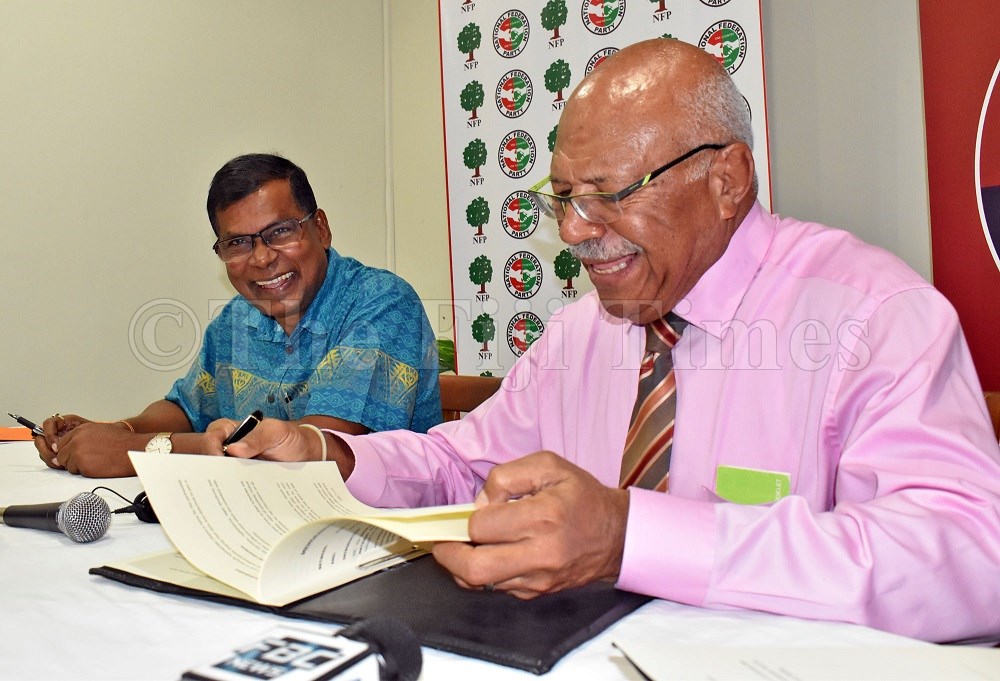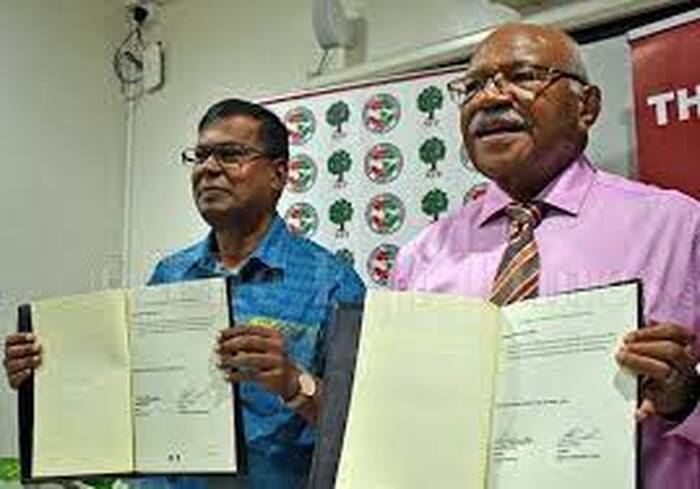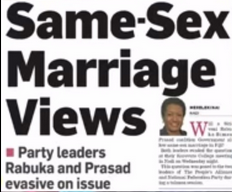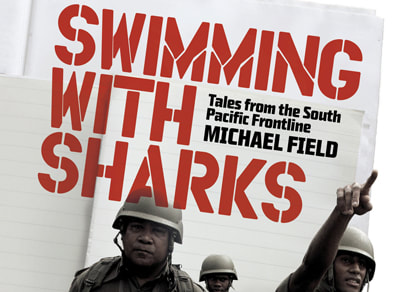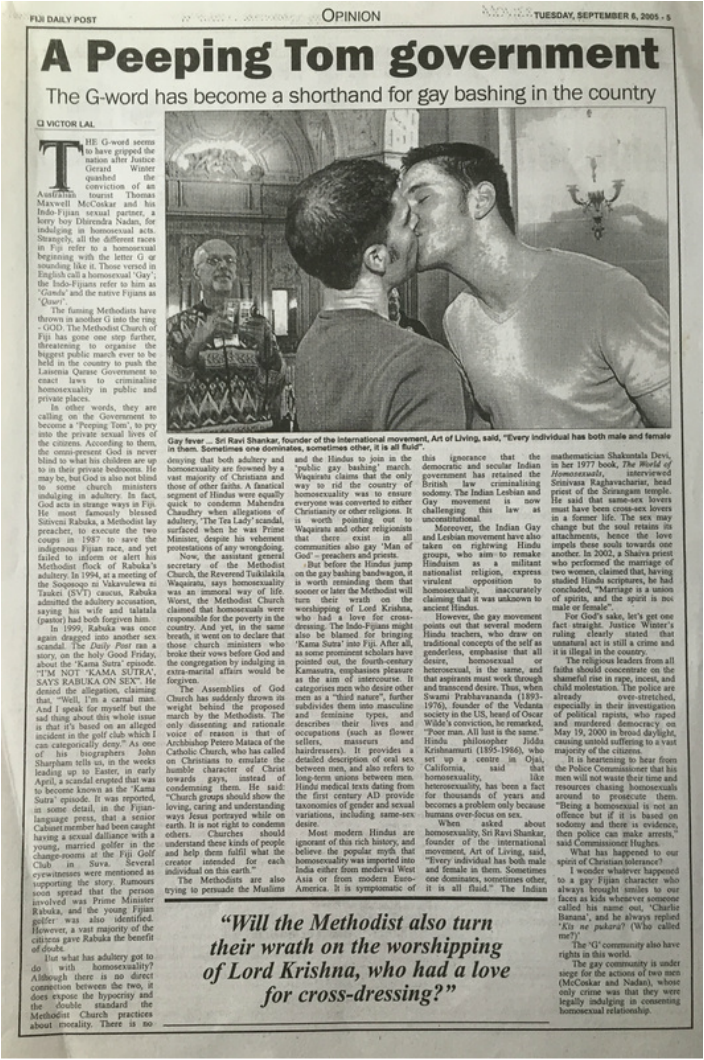GIRMIT HOLIDAY: Both 'Adam and Steve' shout they will give us 'Girmit Day' on 14 May. We say NEVER must we have Girmit Holiday, for it will be eternally linked to the racist's 14 May 1987 COUP.
*Yes, will they approve of same-sex marriage if and when they come to power? At the Korovutu meeting, both declared that they would remove restrictions that ban trade union leaders from participating in national politics.
*We had always championed trade union rights, but after reading
DANIEL URAI informing Fijians to only VOTE for PAP/NAG coalition in the coming elections, we say:
Keep these political rascals LOCKED OUT OF POLITICS
Why should Unity Fiji promise to scrap the trade union decree in their manifesto if the reward from Urai is his call to vote for
Coupist Sitiveni Rabuka and his sidekick Biman Prasad
*Once again, the recently politically married couple 'Adam and Steve' must tell us of their position on the same-sex-marriage in Fiji.
*We know Prime Minister Frank Bainimarama's position:
'God created Adam and Eve, NOT Adam and Steve'
Fiji never fails to disappoint us. We may recall the Opposite Sex Scandal
SUVA (Pacific Media Watch): A Fiji court hearing a paternity suit against former Prime Minister Sitiveni Rabuka filed by controversial senior Fiji Times journalist Margaret Wise has been closed to journalists, report local news media.
According to the Fiji Times of 26 January 2002, the Magistrates Court hearing of the case on January 25 was closed in a move described by a court source as "not regular practice".
The paper said Magistrate Amani Rokotinaviti could not be reached for comment and questions faxed to the Solicitor-General's Office were not answered.
The police court orderly told the paper he had closed the doors on the instructions of the court clerk.
The court was to determine whether 1987 coup leader Rabuka fathered journalist Margaret Wise's 18-month-old son, the Fiji Times reported.
The lawsuit was filed by Wise after Rabuka allegedly failed to honour a settlement
.
In the first of three court hearings, Rabuka said a DNA test was in his favour.
In the following hearing, Rabuka said he could not understand the findings, but was willing to pay a weekly maintenance of F$50.
The Fiji Sun reported that Wise had rejected this and wanted Rabuka to admit paternity before a financial settlement was discussed.
The case has been adjourned until February 11.
* PMW reports: Wise has been at the centre of controversial allegations over so-called "skirt journalism", most recently in an open letter to the Sun on January 7 by New Labour Unity Party general secretary Tomasi Tokalauvere.
According to the Fiji Times of 26 January 2002, the Magistrates Court hearing of the case on January 25 was closed in a move described by a court source as "not regular practice".
The paper said Magistrate Amani Rokotinaviti could not be reached for comment and questions faxed to the Solicitor-General's Office were not answered.
The police court orderly told the paper he had closed the doors on the instructions of the court clerk.
The court was to determine whether 1987 coup leader Rabuka fathered journalist Margaret Wise's 18-month-old son, the Fiji Times reported.
The lawsuit was filed by Wise after Rabuka allegedly failed to honour a settlement
.
In the first of three court hearings, Rabuka said a DNA test was in his favour.
In the following hearing, Rabuka said he could not understand the findings, but was willing to pay a weekly maintenance of F$50.
The Fiji Sun reported that Wise had rejected this and wanted Rabuka to admit paternity before a financial settlement was discussed.
The case has been adjourned until February 11.
* PMW reports: Wise has been at the centre of controversial allegations over so-called "skirt journalism", most recently in an open letter to the Sun on January 7 by New Labour Unity Party general secretary Tomasi Tokalauvere.
The late RUSSELL HUNTER to our Fijileaks Editor, Tues 27 May 2008:
'It is not well known etc etc. Margaret was sacked (by me) for indiscipline'
"I expected Field to be more critical about media ethics and “skirt journalism” by journalists who obtained stories by sleeping with a former prime minister. [Michael] Field named two journalists, Wainikiti Waqa and Margaret Wise, who had affairs with SVT prime minister Sitiveni Rabuka, who staged Fiji’s first two coups in 1987...Field also notes that: “Rabuka fathered a boy with Wise and then denied it was his.” A DNA paternity test indeed found Rabuka was the father of Wise’s child: “The court found he was the father and he was ordered to pay F$30 a week.” As a veteran journalist on whom some developing world journalists in the Pacific, especially my former Daily Post ones, have looked for guidance, Field remained silent on the morality and propriety of the leading multinational media company in Fiji [The Fiji Times] allowing such a conflict of interest – not only to exist, but flourish."
Sleeping with journalists
Media ethics – or the lack of them – in Fiji has been in the news since allegations surfaced in 1999 of improper dealings by media in general and the Australian-owned Fiji Times in particular, the newspaper recently given three months by the regime to sell off 90 percent of its shareholding to local interests.
Since then debates have been rife about the balance and “agenda” of The Fiji Times, particularly raised by former prime minister Mahendra Chaudhry when in office between 1999 and when he was deposed in the George Speight attempted coup in May 2000.
I expected Field to be more critical about media ethics and “skirt journalism” by journalists who obtained stories by sleeping with a former prime minister.
Field named two journalists, Wainikiti Waqa and Margaret Wise, who had affairs with SVT prime minister Sitiveni Rabuka, who staged Fiji’s first two coups in 1987.
On this issue, Ratu Inoke Kubuabola, then cabinet minister and now Bainimarama’s Foreign Affairs Minister, called for Rabuka to resign. Field writes: “Rabuka replied that he would go, provided whoever succeeded him could prove that he had not also committed adultery.”
Field also notes that: “Rabuka fathered a boy with Wise and then denied it was his.”
A DNA paternity test indeed found Rabuka was the father of Wise’s child: “The court found he was the father and he was ordered to pay F$30 a week.”
As a veteran journalist on whom some developing world journalists in the Pacific, especially my former Daily Post ones, have looked for guidance, Field remained silent on the morality and propriety of the leading multinational media company in Fiji allowing such a conflict of interest – not only to exist, but flourish.
Field did not say anything about The Fiji Times allowing the same Margaret Wise play such a key role in penning articles, opinions and stories on Chaudhry’s People’s Coalition government, the accuracy and balance of which had been questioned and challenged by Chaudhry and his government on many occasions.
Would that have been tolerated in other democracies, including Field’s New Zealand? Would Fairfax allow such a journalistic sin to flourish?
Media ethics – or the lack of them – in Fiji has been in the news since allegations surfaced in 1999 of improper dealings by media in general and the Australian-owned Fiji Times in particular, the newspaper recently given three months by the regime to sell off 90 percent of its shareholding to local interests.
Since then debates have been rife about the balance and “agenda” of The Fiji Times, particularly raised by former prime minister Mahendra Chaudhry when in office between 1999 and when he was deposed in the George Speight attempted coup in May 2000.
I expected Field to be more critical about media ethics and “skirt journalism” by journalists who obtained stories by sleeping with a former prime minister.
Field named two journalists, Wainikiti Waqa and Margaret Wise, who had affairs with SVT prime minister Sitiveni Rabuka, who staged Fiji’s first two coups in 1987.
On this issue, Ratu Inoke Kubuabola, then cabinet minister and now Bainimarama’s Foreign Affairs Minister, called for Rabuka to resign. Field writes: “Rabuka replied that he would go, provided whoever succeeded him could prove that he had not also committed adultery.”
Field also notes that: “Rabuka fathered a boy with Wise and then denied it was his.”
A DNA paternity test indeed found Rabuka was the father of Wise’s child: “The court found he was the father and he was ordered to pay F$30 a week.”
As a veteran journalist on whom some developing world journalists in the Pacific, especially my former Daily Post ones, have looked for guidance, Field remained silent on the morality and propriety of the leading multinational media company in Fiji allowing such a conflict of interest – not only to exist, but flourish.
Field did not say anything about The Fiji Times allowing the same Margaret Wise play such a key role in penning articles, opinions and stories on Chaudhry’s People’s Coalition government, the accuracy and balance of which had been questioned and challenged by Chaudhry and his government on many occasions.
Would that have been tolerated in other democracies, including Field’s New Zealand? Would Fairfax allow such a journalistic sin to flourish?

